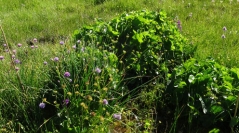

 Naturae
2019 (6) - Pages 165-173
Naturae
2019 (6) - Pages 165-173A “syntaxonomic identification” is a set of operations aimed at attributing a syntaxonomic identity, as precise as possible, to the various vegetal communities present in a given study area. Syntaxinomic identifications are omnipresent in natural and semi-natural areas management projects in France, ranging from management plans for Natura 2000 sites, to management actions on Vulnerable Natural Areas (“espaces naturels sensibles”) and on Natural Reserves. Moreover, the demand for these identifications is increasing among managers. At first sight, one might think that this omnipresence is entirely justified. Indeed, there is a consensus among ecologists and phytosociologists that the composition of vegetal communities provides reliable information, not only on local biodiversity, but also on ecological functioning and on the pressures that communities undergo. Unfortunately, the tools and knowledge available today in France are insufficient and ill-adapted, and the current practices are undermined by a deep methodological confusion. Indeed, they use species lists as identification tools, whereas in fact species lists are description tools, rather than full-fledged identification tools. As a consequence, we argue that our current predicament in France is such that it would be better for managers to avoid demanding syntaxinomic identifications. Obviously enough, in the longer term, it would be desirable to make sure that realizing rigorous syntaxinomic identifications can become possible in the various management contexts mentioned above. To achieve this objective, a crucial (but by no means sufficient) step would be the elaboration and diffusion of open access phytosociological databases.
Phytosociology, identification, methodology, knowledge gaps, databases.